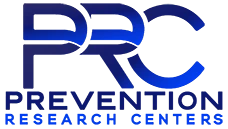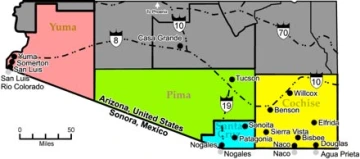
About the PRC
The University of Arizona Prevention Research Center (AzPRC) strives to address chronic disease health disparities in underserved populations in Southern Arizona.

The Southern Arizona region includes four U.S. counties that lie on the U.S.-Mexico Border: Cochise, Pima, Santa Cruz, and Yuma. The AzPRC has been working with communities along this 389-mile long border for over 20 years. Our partner communities include: Douglas, Nogales, and Somerton/San Luis, as well as the Tohono O’Odham Nation which has lands that extend from just south of Casa Grande, through western Pima County and into Mexico. One-way travel time from Tucson ranges from 1¼ hour to Nogales to 4 hours to Somerton/San Luis.
The activities of the AzPRC are planned collaboratively with our Community Action Board (CAB). The CAB is composed of ~20 organizations and programs that share a common agenda of improving the quality of life in the border region. CAB members are responsible for guiding AzPRC activities and have expressed their support and commitment to expand upon our foundation of:
- Developing and disseminating evidence-based strategies to address disparities in health promotion and disease prevention using the Community Health Worker model (CHW); and
- Promoting health through environmental and systems change strategies on both a local and state level.

As stated in our tagline, the AzPRC and our partners are committed to “Championing Community Health Worker Effectiveness in Arizona and Beyond.” This means not only working collaboratively to develop, evaluate and research CHW programs, but also to work collectively within the state and nationally for recognition and sustainability of this valuable workforce.
AzPRC activities are funded by the Centers for Disease Control and Prevention's (CDC) Prevention Research Center Program through the National Center for Chronic Disease Prevention and Health Promotion. Prevention Research Centers constitute a network of academic, community, and public health partners that conduct applied public health research. PRCs create health promotion and disease prevention strategies that work and can bring long-term benefits to communities. PRCs also offer training and technical assistance to the public health community.



